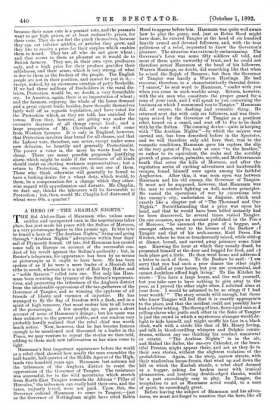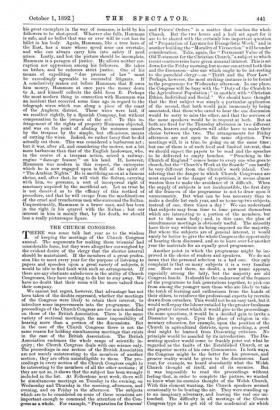AHERO OF " THE ARABIAN NIGHTS." T HE Sid Abd-es-Ilam el
Hammam who, unless some sudden and unexpected turn in the negotiations takes place, has just made his peace with the Sultan of Morocco, is a very picturesque figure in this prosaic age. In him is to be found a hero of " The Arabian Nights," living and going through " Arabian Nights " adventures within four days' sail of Plymouth Sound. Of late, Sid Hammam has caused some talk in Europe on account of the successful con- duct of his revolt against the Sultan's authority ; but, in Reuter's telegrams, his appearance has been by no means as picturesque as it ought to have been. He has been spoken of as if he were a mere leader of a Moorish hill tribe in revolt, whereas he is a sort of Rob Roy, Hofer, and a " noble Saracen " rolled into one. Not only has Ham- mam been resisting the tyranny of the Sultan's representa- tives, and protecting the tribesmen of the Anghera district from the intolerable oppressions of the tax-gatherers of the Governor of Tangier, and so winning the applause of all friends of liberty and enemies of injustice. He has managed to fly the flag of freedom with a dash, and in a spirit of high romance, that must endear him to all lovers of the picturesque. A few months ago, we gave a short account of some of Hammam's doings ; but his name was then unknown to the general public, and our readers very probably hardly realised that the rebel chief was worth much notice. Now, however, that he has become famous enough to be mentioned and discussed in a leader in the Times, we may venture to repeat the stories we then told, adding to them such new information as has since come to light. Hammam's first important appearance before the world as a rebel chief, showed how nearly the man resembles the half-bandit, half-patriot of the Middle Ages or of the High- lands two hundred years ago. Hammam last autumn led the tribesmen of the Anghera district to resist the oppressions of the Governor of Tangier. The resistance was successful, for in the wild mountains which stretch from North-East Tangier towards the African " Pillar of Hercules," the tribesmen can easily hold their own, and the taxes, unjustly levied, were not paid. Upon this, the Governor ordered Hammam to come to Tangier, just as the Governor of Nottingham might have cited Robin Hood to appear before him. Hammam was quite well aware how to play the game, and, just as Robin Hood might have done, he entered Tangier at the head of six hundred heavily armed and devoted followers, and, with the true politeness of a rebel, requested to know the Governor's pleasure. The situation was extremely embarrassing. The Governor's force was some fifty soldiers all told, and most of them quite unworthy of trust, and he could not therefore arrest Hammam at the head of his followers. Warren Hastings, no doubt, did something like that when he seized the Rajah of Benares ; but then the Governor of Tangier was hardly a Warren Hastings. He had recourse, therefore, to a characteristically Oriental device. "I cannot," he sent word to Hammam, " confer with you when you come in such warlike array. Return, however, with the six men who constitute the proper guard for a man of your rank, and I will speak to you concerning the business on which I summoned you to Tangier." Hammam did, of course, the dashing and romantic thing. He returned next day with only six followers, and was there- upon seized by the Governor of Tangier as a pestilent rebel, bound on a camel, and sent off to Fez to be dealt with by the Sultan. The cunning device—quite in keeping with " The Arabian Nights "—by which the seizure was carried out, has been described before in the Spectator, and we will therefore only add here that, true to the romantic conditions, Hammam gave his captors the slip at the very gates of Fez, took at once " to the heather," or rather to its equivalent, the rocks and the scrubby growth of gum-cistus, palmetto, myrtle, and Mediterranean heath that cover the hills of Morocco, and after the regulation series of exciting adventures and hairbreadth escapes, found himself once again among his faithful Angherites. After this, it was soon open war between Hammam and his old enemy, the Governor of Tangier. It must not be supposed, however, that Hammam was the man to conduct fighting on dull, modern principles. He varied the operations of war by excursions into the enemy's city, undertaken in disguise, which read exactly like a chapter out of " The Thousand and One Nights." Notwithstanding that a price was upon his head, and that he would have been killed instantly had he been discovered, he several times visited Tangier. On one occasion, says an account published in the Times of Morocco, "he assumed the guise of a beggar, and, amongst others, went to the houses of the Bashaw cf Tangier and that of his arch-enemy, Kaid Drees Em Kitchet, where he was so treacherously seized, while sitting at dinner, bound, and carried away prisoner some time ago. Knowing the hour at which they usually dined, he presented himself at the door and begged for food, and at each place got a little. He then went home and addressed a letter to each of them. To the Bashaw he said: am sorry that you had such a poor dinner the other night when I called at your house, but you are economical, and cannot doubtless afford high living.' To Em Kitchet he wrote : 'You have a large house, and live well yourself, but you take care to have nothing to give away to the poor, as I proved the other night when I solicited alms at your door. I would be ashamed to be so stingy if I had your wealth.' " The story sounds wild enough, but those who know Tangier will feel that it is exactly appropriate to the place, and that the incident could not possibly have had a better setting. The throng of lean, fierce-eyed men aid yelling slaves who jostle each other in the Soko of Tangier is just the crowd in which a mysterious stranger would de- light to hide himself, and might muffle his face in a black cloak, walk with a stride like that of Mr. Henry Irving, and talk in blood-curdling whispers and Delphic conun- drums, without any one thinking his conduct unnatural or erratic. " The Arabian Nights " is in the air, and Sinbad the Sailor, the one-eye Calender, or the beau- tiful Persian, might appear there, and act as they do in their own stories, without the slightest violation of the probabilities. Again, in the steep, narrow streets, with their windowless house-fronts, that wind up and down the hill on which the Kasbah stands, a rebel chief dressed as a beggar, asking for broken meat with ironical pleasantries, and bestowing double-edged thanks, would be a part exceedingly easy to play. In Tangier, the temptation to act as Hammam acted would, to a man of spirit, be exceedingly great. Before leaving the subject of Hammam and his adven- tures, we must not forget to mention that the hero, like all his great exemplars in the way of romance, is held by his followers to be shot-proof. Whoever else falls, Hammam is safe, and no bullet that was or ever will be cast has its billet in his body. Again, Hammam, like a true hero of the East, has a mare whose speed none can overtake, and who can always carry him into safety if need arises. Lastly, and lest the picture should be incomplete, Hammam is a paragon of justice. He allows neither cor- ruption nor oppression among his followers. He takes no bribes, and he enforces strict justice. One of his means of expediting " due process of law " must be exceedingly agreeable to successful litigants. If A conclusively makes out before Hammam that B owes him money, Hammam at once pays the money down to A, and himself collects the debt from B. Perhaps the most modern thing in connection with Hammam was an incident that occurred some time ago in regard to the telegraph wires which run along a piece of the coast of the Anghera district. These wires were laid, if we recollect rightly, by a Spanish Company, but without compensation to the owners of the soil. To this in- fringement of the rights of property Hammam objected, and was on the point of abating the nuisance caused by the trespass by the simple, but efficacious, means of cutting the wires. Indeed, we rather fancy that he did actually cut them. This was considered a barbarous act ; but it was, after all, and considering the motive, not a bit more barbarous than that of the English landowner, who, in the course of a trespass action, seized a railway- engine " damage feasant " on his land. If, however, Hammam was modern in this respect, the enterprise which he is now engaged upon is full of the spirit of " The Arabian Nights." He is sacrificing an ox at a famous shrine, and, after that, he will visit the Sultan, carrying with him, we presume, a sort of incorporeal right of sanctuary acquired by the sacrificial act. Let us trust he is not deceivt-d as to the efficacy of this method of procedure, and that he will escape from the machinations of the cruel and treacherous men who surround the Sultan. Unquestionably, Hammam is a brave man, and has been in the right in his quarrel with the Sultan ; but our interest in him is mainly that, by his death, we should lose a really picturesque figure.



































 Previous page
Previous page